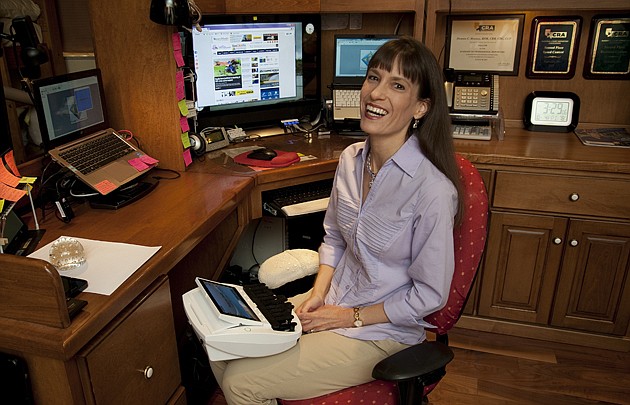- December 20, 2024
-
-
Loading

Loading

Dee Boenau, who runs a closed captioning service with her husband, Jack Boenau, has a unique claim to fame: She's one of the fastest, and most accurate, stenographers in the world.
Dee Boenau, in fact, can type 300 words per minute with a 95% accuracy rate. That's how she's won industry awards from Florida to Pennsylvania to Paris. “I consider stenographic machines my artwork,” says Dee Boenau. “You can build upon it to create your own vision.”
A St. Petersburg native, Boenau graduated from the Pinellas Technical Education Centers. She started her stenography career in 1992, with Hillsborough County. She met Jack at a Florida Court Reporters Association meeting, and now they run Sarasota-based AmeriCaption together. The firm's specialty is providing real-time closed captions for TV news programs and other clients that require high levels of speed and accuracy. One large client is WFLA Channel 8 in Tampa.
Here's a glimpse into how the Boenaus work.
Several screens: The Boenaus have multiple screens up when they work, to make sure they don't miss anything. They do close captioning work for WFLA's news programs by watching the online newscasts. The online version doesn't have the seven-second delay TV does.
The multiple screen approach was important in 2003 and 2004, when WFLA asked the Boenaus to work literally around the clock to provide closed captioning services during hurricane coverage. For one storm, Jack Boenau says, the couple worked 60 hours straight. One person would work while the other took a two-hour nap in a bunk bed in their office/bunker.
Redundancy required: Most stenography machines, like Dee Boenau's Passport Touch, shown below, cost around $5,000. The software is another $7,000. The Boenaus have two sets of every machine, software program and other essential materials. They even have a generator. The redundancy protects against losing power in a storm.
Early going: Jack Boenau has been a stenographer since 1969. He worked in Iowa and Orlando before he founded AmeriCaption. “We like to put out a very accurate product,” says Boenau. “We are pretty exacting.”
Short cuts: Being good at stenography, says Dee Boenau, takes an extreme amount of focus and concentration, in addition to speed. One trick is Sticky Notes, strategically placed around her desk, that are secret keystrokes she uses for phrases, names and words. “I don't train,” Boenau says. “Competing is a way for me to measure my own improvement throughout my career.”
Recognition: Dee Boenau has more than 20 medals for first, second or third place in national and global stenography competitions. She's also competed for Guinness World Records in stenography speed. One of her biggest triumphs is a second-place finish at the Intersteno World Speech Capturing Competition in Paris in 2011. She finished behind a Chinese competitor.
Her most recent recognition came from the National Court Reporters Association annual speed contest, held in August in Nashville. Contestants wrote and transcribed a literary leg read at 220 words per minute; a legal opinion read at 230 words per minute; and a portion of testimony read at 280 words per minute. Contestants had to score an accuracy rate of 95% or better to qualify, and the best combined speed-time score won. Boenau came in second place in that contest, too — she lost by one second.
While Dee Boenau is proud of her awards, she says the contests are really a way to avoid complacency. “The speed contest is something I never thought I would win,” she says. “I never dreamed I could do it.”
Adds Boenau: “I want to see how good I can be. I want to take this as high as I can.”